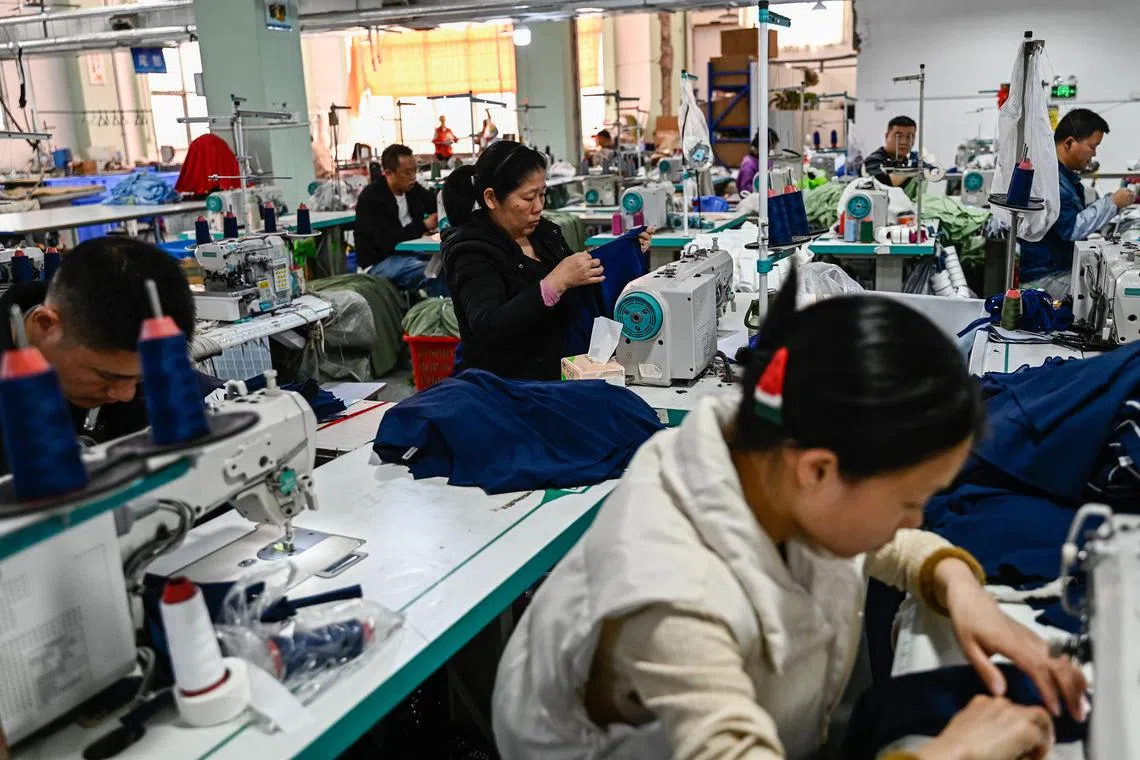Trump tariffs shake up China’s factory heartland
Sign up now: Get insights on Asia's fast-moving developments

Many suppliers in Dongguan have migrated operations to South-east Asia in recent years, seeking lower labour costs and less stringent customs duties.
PHOTO: AFP
DONGGUAN, China - In a drab office in China’s industrial heartland, Mr Andy Xiao frets over the future of his shoe materials business, now straining under sweeping tariffs imposed by US President Donald Trump.
Mr Trump has targeted friend and foe alike since taking office in January, notably imposing additional 10 per cent duties on products imported from China.
The move could affect hundreds of billions of dollars in trade and may worsen if the mercurial magnate follows through on his threats of even higher customs levies.
But for Mr Xiao, the policy is already having “a major impact” on his firm, Weida New Materials.
Based in the southern city of Dongguan, the company makes artificial leather for shoe manufacturers, many of whom export to the US.
The model leaves him vulnerable to downturns in shipments, a distinct possibility as Mr Trump looks to upend trade rules.
“This has put a lot of pressure on us in China, and factories are also under pressure,” said Mr Xiao, adding that some shoe manufacturers have already requested lower prices in response to the new tariffs.
“There are definitely some concerns” about further hikes, he said, “but that is a matter of national policy – it’s not up to us”.
Mr Xiao said that if exports run into insurmountable hurdles, Weida may be forced to change its business model.
“If there is business (in the United States), we’ll do it. If not, we can find other business domestically. We’re not just targeting a single overseas customer, are we?“
Many suppliers in Dongguan – home to a dense concentration of garment exporters – have migrated operations to South-east Asia in recent years, seeking lower labour costs and less stringent customs duties as trade frictions between Beijing and Washington persist.
But Mr Xiao, who entered the industry in 2014, said he had resisted the trend as many companies ended up struggling with unforeseen challenges like getting paid for shipments on time.
“Firms have migrated in recent years, but feedback of many people that went there wasn’t very good,” said Mr Xiao.
“They encountered many difficulties,” he said, such as obstacles in settling payments with currencies other than China’s renminbi. “The risks are great.”
When the levy breaks
In a factory complex in the city of Guangzhou, rows of employees bend over clattering sewing machines, churning out heaps of clothes for bargain-seeking American online shoppers.
The workshops are among thousands to see orders surge in recent years by supplying hyper-efficient e-commerce platforms Shein and Temu, which have taken the US by storm.
Those brands have built their models largely on a US policy known as the de minimis exemption,
Mr Trump has said the 10 per cent tariff will also apply to those products – but imports have continued as usual while the authorities figure out the logistics of taxing the torrent of shipments.
Still, Mr Zhu, a factory production manager in his late thirties whose company exports to the US, said he was “relatively optimistic” about business prospects.
Mr Zhu said he had noticed a significant uptick in orders in recent years, as the new low-cost e-commerce giants amass huge customer bases in developed countries.
“If you think about it, the United States definitely will not produce its own clothing,” he said.
“They have become used to relying on manufacturing in South-east Asia and China… so future prospects for the processing industry are still pretty good,” he told AFP.
No Trump slump, yet
China has stated “resolute opposition” to Mr Trump’s fusillade of tariffs, responding with reciprocal measures
Beijing is battling long-term economic problems of its own, with slowing growth adding to a debt crisis in the property sector, low consumption and high youth unemployment.
The country’s southern export belt provides jobs to millions of people, many of them migrants from deprived rural areas.
But workers in an area unofficially dubbed “Shein town” mostly shrugged off the tariffs – at least while their impact remains bearable.
“Production is busy so we just focus on that,” said Peng, Mr Zhu’s co-worker, adding that it was a matter for senior management.
Mr Zhong, a manager at a clothing factory in the nearby city of Zhongshan, told AFP while perusing local job boards he was not worried about trade frictions with the US.
The manufacturing hub where he works has also been bustling in recent years, Mr Zhong said, adding that he had come to “Shein town” to compare employment scenes.
“I think our government will be able to respond and figure out a solution,” he told AFP, as hundreds of workers behind him walked back to the factories for afternoon shifts. AFP


